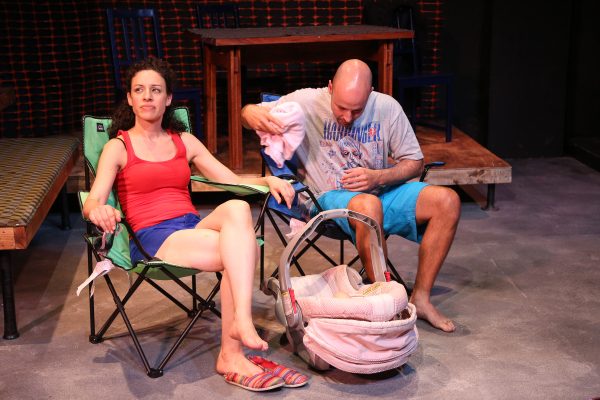The Goddess

(© 2013 Michael Priest)
Looking for a date-night show that's practically guaranteed to spark animated conversation between you and your significant other — and maybe touch a nerve or two? Then Looking Glass Theatre's production of The Goddess, a new play receiving its premiere at the Richmond Shepard Theatre, is for you. Written by Justine Lambert and Kenneth Nowell, and directed by Alice Jankell, this 90-minute "modern-day fairy tale about open marriage" tackles the conflict between modern society's sexual contracts and good ol' human biology. It also asks some provocative questions like: Is it possible to balance sexual freedom with the responsibilities (emotional and otherwise) of a committed relationship? And, if your partner were OK with you sleeping with other people, would you? Regardless of whether you leave the theater with any answers, The Goddess will get your Freudian juices bubbling to the surface.
Emma and Mike have been married for years now, but Emma (played with poignant humor by Tricia Alexandro) suspects that Mike lusts after other women. Of course he does: He's a man. Standing in the background, literally, like a Freudian personification of the id or Eros, or both, the goddess Venus (Claudia Mason) relentlessly goads Emma into challenging Mike (played smartly by Richard Busser) about what's on his mind when he sees a girl in a bikini lying on the beach. It's fine that he wants to have sex with her, Emma tells herself. She's convinced that there's something wrong with what marriage does to people, and she finally admits to herself that she wants a way out of this type of (read: monogamous) relationship. Why not let her hubby fool around with another woman and see what happens? So Mike, with Emma's consent, has his first extramarital sexual encounter during a wine-soaked evening with a female friend (Sarah Nedwek). And suddenly, everything's different. The couple's first meeting after Mike has committed the deed is fraught with awkwardness and guilt, but there's no going back now. The marriage has entered a new phase, and both husband and wife embark on a journey of sexual liberty.
It's all lovely for a while. Emma, a workaholic constantly plagued by prickly calls from her boss, flies off to distant lands for business and pleasure, hopping into the sack with Frenchmen and Texans and surfer dudes aplenty. (I counted five different men, all played uproariously by Michael Kingsbaker, having sex with Emma in less than two minutes during one of the play's most hilarious scenes.) Horndog Mike takes advantage of Emma's frequent absences, and he beds one woman after another (all played by the talented Nedwek) as indiscriminately as his wife sleeps with men. It doesn't take long, though, for the vacuity of it all to wear on Emma. It takes a climactic confrontation (moderated by the goddess) between a now jealous Emma and an emotionally distant Mike to reveal a deeper truth about their relationship and their love for each other.
There's a lot to like about The Goddess. The writing is brisk, funny, and smart, and the sparse set (designed by Deb O) in the intimate Richmond Shepard Theatre effectively presents the couple's world in microcosm, allowing the actors, who make costumes changes at lightning speed, to move through time and space seamlessly. The Venus character is perhaps the most befuddling element of the play. Mason performs the role with great energy, but it's not always clear what exactly the goddess represents. In the beginning, she appears to be a part of Emma's subconscious. Later she seems to be an actual physical presence with whom Mike is able to interact, a (now) goat-legged, satyr-like goddess who delivers a Darwinian case for monogamy. Maybe this is the "fairy tale" part of the story, but it's confusing. The goddess is a curious conceit that might have benefitted from some tweaking.
Nevertheless, the play is a perceptive, often humorous look at the mating habits of the human animal. But The Goddess, ultimately, isn't about sex or monogamy or fidelity or marriage or any of that. It's about getting to the roots of your individual truth and acknowledging your desires without fear or guilt. That said, anyone going to this play hoping to convince a partner that it's OK to open up their relationship may be disappointed. Then again, maybe not. Lambert and Nowell have intentionally written in enough ambiguity to spur discussion — if you dare to be honest.











